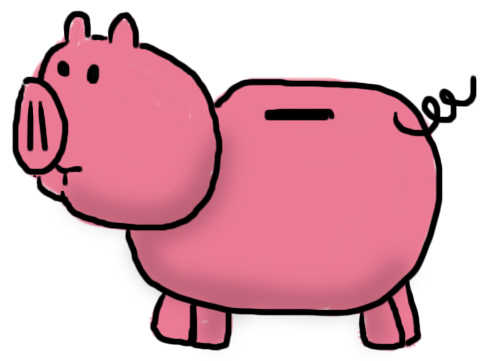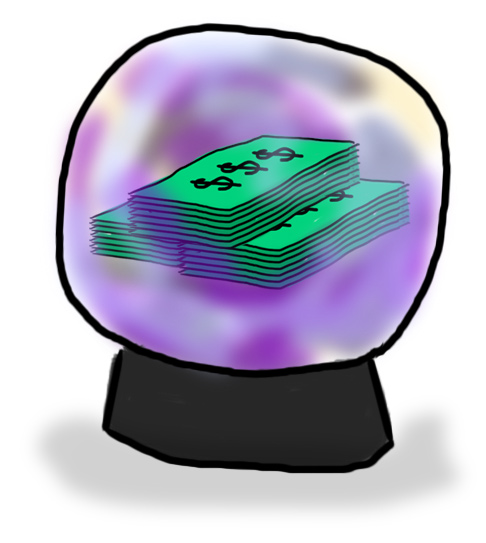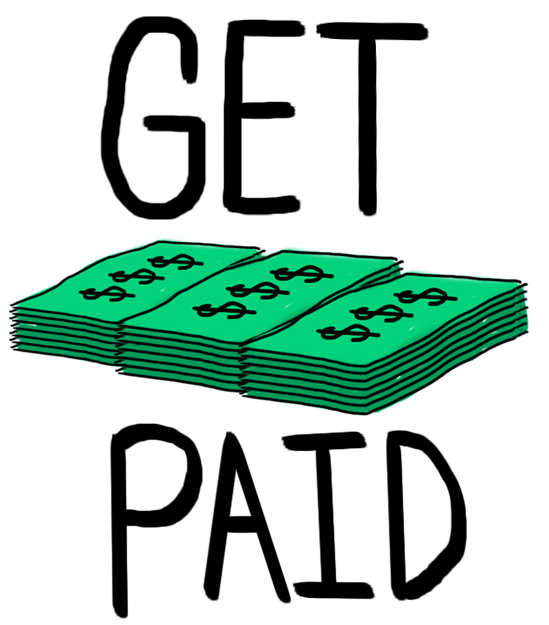Say you owe money to the bank, a couple credit card companies, your landlord, the government, or the power company. Well, they don’t care how smart you are, where you’ve traveled, how good your idea is, where you went to school, how many Facebook friends you have or when you joined Twitter.
The famous Wu-Tang Clan lives by the philosophy, “C.R.E.A.M.” which is an acronym for “Cash Rules Everything Around Me.” It’s a sad but true reality in business and life. Cash is king.
“Did Allan write this?”
If you’re a designer or a developer; conversations about money, budgets, and cash flow are probably boring to you, but they’re a necessary evil in keeping your business alive and healthy.
Here are some definitions for things that will help you stay in business:

Spending money is fun. Allan, for example loves to purchase hookers and blow. Just kidding, Allan’s Mom. He loves to buy the latest educational toys for his children! Being able to save money and spend money in the effective areas will be the difference in your company surviving or dying. Cash is king. If you don’t have cash on-hand, you’re simply waiting on your business to collapse. If you stopped getting a paycheck today, how many weeks would it be before you were broke?
You are not special. You will have a cash flow hiccup. Something will happen; you’ll get sick, your air conditioning will go out, or you’ll lose your best client.
What does “be prepared” mean? It simply means you should save money and have three months or more of cash on-hand both within your business and your personal funds. If your company spends $10,000 a month on average, then your business should keep $30,000 cash in the bank at all times.
If you personally spend $5,000 a month, you should have a savings account with $15,000 in it. These cash reserves should NEVER be touched.
You buy furniture. You tell yourself, this is the last sofa you’ll ever need in your life; no matter what else goes wrong, you’ve got the sofa issue handled. Then the right set of dishes. Then the right bed. The drapes. The rug. This is how you’re good to yourself. This is how you fill up your life. The things you own, they end up owning you. Enough said.
Money is an excuse to temporarily justify working that job you hate. You buy the nicer car, you buy the iPad, you finance that big screen TV, and you create these debts that slowly become the whole reason for your work. You’re working FOR your possessions. You can’t take a day off. You can’t miss a payment. You’re a slave, a slave to your TV. You’re a slave to your inability to control your spending. You’ll spend away your real happiness in the attempt to please your flesh in $20, $200, and $500 purchases. These little purchases are excuses and justifications. You buy that nicer car because you feel like you deserve it. You deserve it because you don’t like your job. You try to please your flesh and make it feel better as you sit in those beautiful leather bucket seats and commute to an office where you hate every second of the day.
Allan has a big house. It’s beautiful. He’s proud of it, but it’s the only debt he has. He doesn’t even own a car. On any given day, you’ll spot him riding his bike to his co-working desk. The point isn’t to not spend money--it’s to spend money on things you’ll remember, things that matter, and things you truly care about. If you are passionate about coffee; buy the best coffee you can find. Buy a $500 coffee maker, but be aware that you are trading your precious time for every penny you spend. That’s time you could be using to take a vacation, hire someone to help you, or travel to a conference to meet people

You’re going to open a business (or maybe you have already). You’re going to get a few clients. The work will pay well and you’ll be happy. The work itself won’t be the type of work you enjoy, but hell yes, it pays well. A year will go by, and you’ll be thinking, “Daaamn that new 2012 car or truck looks sweet!” so you’ll buy it.Maybe you’ll buy a bigger house (oh that sounds good, and you deserve it).
Then one day, something will happen. Your main client will leave, you’ll become very sick or maybe your best employee will steal your best client. The point is, your income will drop. There will be a cash flow hiccup. Maybe its just a 30% drop in revenue for a few months. Maybe a couple of planes will hit a pair of buildings in a major city and your income drops by 70% for two years. Maybe an oil rig will explode and cover your city’s beaches with tar. This hiccup will be out of your control.
In the vast majority of situations, that extra income the person starts to make is sucked up in purchases. It’s hard not to want to show off your successes. Saving money doesn’t show everyone how awesome you are. Spending money makes you look and feel successful. Spending money feels so good to your ego. “Hey everyone look at me! I’m buying new things!” Be wise and mature with your money, prepare yourself, save up a cash pad and only spend money on the things that matter. Look at any business. Talk to any experienced business owner. Ask them if they’ve ever had a time when revenue dropped. The answer will be YES, and you’re bound to experience it, at some point, too.
We were in this situation at the end of 2009. We had succumbed to the “One Big Client Syndrome.” We had one big client who was supporting the company. It left us a lot of time to work on our products and it was a pretty sweet deal. Then there was an internal struggle for power at the company and they stopped everything until it was resolved. They gave us two weeks notice, which is more than you should expect. For the first time since LessEverything was born, we were scrambling to meet payroll and actively trying to find new business. We lost a great employee as a result.

Getting paid can be one of the hardest things to do. There’s an old joke about a guy getting the check at the end of a meal: the guy turns to the waiter and says, “Why am I buying all this food? I’m not hungry.” Allan and Steve found it’s much easier to get paid before a project than after, so that’s how they do it. LessEverything takes a deposit up front for the first two weeks of work. At the beginning of the second week, an invoice is sent for the following two weeks and so on. They never work without having already been paid for it.
Cashflow is the lifeblood of your business, here's how to avoid cashflow issues.